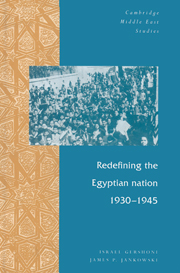Book contents
- Frontmatter
- Contents
- Illustrations
- Preface
- Acknowledgments
- List of abbreviations
- 1 The roots of supra-Egyptian nationalism in modern Egypt
- Part I The intellectual formulation and social dissemination of new supra-Egyptian orientations and ideologies
- 2 “Now is the turn of the East”: Egyptian Easternism in the 1930s
- 3 “The return of Islam”: the new Islamic mood in Egypt
- 4 Egyptian Islamic nationalism
- 5 Integral Egyptian nationalism
- 6 Egyptian Arab nationalism
- Part II Supra-Egyptianism in Egyptian politics
- Notes
- Select bibliography
- Index
6 - Egyptian Arab nationalism
Published online by Cambridge University Press: 24 November 2009
- Frontmatter
- Contents
- Illustrations
- Preface
- Acknowledgments
- List of abbreviations
- 1 The roots of supra-Egyptian nationalism in modern Egypt
- Part I The intellectual formulation and social dissemination of new supra-Egyptian orientations and ideologies
- 2 “Now is the turn of the East”: Egyptian Easternism in the 1930s
- 3 “The return of Islam”: the new Islamic mood in Egypt
- 4 Egyptian Islamic nationalism
- 5 Integral Egyptian nationalism
- 6 Egyptian Arab nationalism
- Part II Supra-Egyptianism in Egyptian politics
- Notes
- Select bibliography
- Index
Summary
The third supra-Egyptian nationalist ideology to develop in Egypt in the 1930s and 1940s was Egyptian Arab nationalism. Like Islamic nationalism and integral nationalism, it too rejected the exclusivist territorial nationalism of the past and in its place postulated an Egyptian identification with a larger entity – in this case, the Arab nation. Its specifics in part overlapped with Islamic nationalism which accepted the Arabness of Egypt as a part of Egypt's Muslim identity, and with integral nationalism which viewed the Arab world as the most immediate arena of Egyptian leadership and greatness.
But Egyptian Arab nationalism had its own character which made it quite distinct from its rivals. The most significant difference was in breadth. The Arabist outlook was less parochial than Islamic nationalism, which because of its religious focus, had little appeal to non-Muslims or those of a secular inclination. It was also less solipsistic than integral nationalism, whose aggressive nature alienated many Egyptians. Belief in Egypt as part of the Arab nation possessed a greater scope of attraction than either the Islamic or the integralist approach. In terms of production, a larger pool of intellectuals participated in its articulation; in terms of reception, it ultimately appealed to a wider range of public opinion. Its content incorporated elements of both Islamicism and integralism as well as of earlier territorial nationalism, but reshaped to fit its particularly Arab perspective. As a result of its synthetic character, it became the most widespread supra-Egyptian ideology of the era.
- Type
- Chapter
- Information
- Redefining the Egyptian Nation, 1930–1945 , pp. 117 - 142Publisher: Cambridge University PressPrint publication year: 1995



